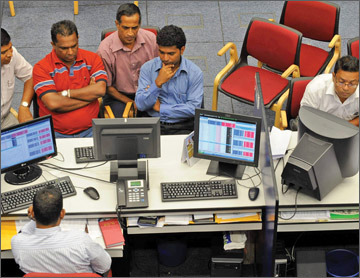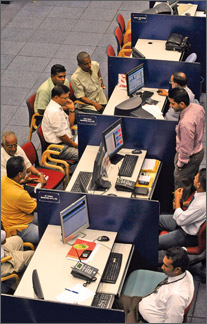Financial literacy is key for stock market investors
Sanjeevi JAYASURIYA
 The Colombo Stock Market is maintaining its position as one of the
best performing markets in the world. However, the retail investor base
is very low and the market needs to widen this base to enable large
number of new entrants to the market to keep it momentum. There are a
few questions that retail investor needs answers such as, is it a good
time to invest in the stock market? How can you get an informed decision
on appropriate investment? The Colombo Stock Market is maintaining its position as one of the
best performing markets in the world. However, the retail investor base
is very low and the market needs to widen this base to enable large
number of new entrants to the market to keep it momentum. There are a
few questions that retail investor needs answers such as, is it a good
time to invest in the stock market? How can you get an informed decision
on appropriate investment?
It is expected that the Colombo Stock Market will come down to a more
realistic value as no market can sustain the kind of returns that the
Colombo Stock Exchange (CSE) provided over the past two years.
Daily News Business interviewed Sri Jayewardenepura University
Finance Professor Dr. Harendra Dissabandara for his comments on the
current position of the stock market and what an investor needs to do.
Here are the excerpts of the interview.
Considering the current market conditions and based on the data
pertaining to CSE, the stock market performance between 2000 to 2010, it
is clear that the month of September has been the most attractive month
in terms of market performance.
September is a good month for investors compared to the last two to
three months. However, it is expected that market participants will
behave in the market wisely and with a positive mind.
We expected September to be the best month this year too, but it did
not come out as such. The market recorded negative return contrary to
our expectations.
Based on my previous research I think there is a moderate improvement
as far as the level of response by the market participants to
availability of information is concerned.
Q. What are the reasons for low retail investor participation
at the market?
A. Many retail investors purchase shares at a higher price
than the actual price. This is mainly due to lack of financial literacy.
Even though learning about investment strategies takes a little time it
will help the investors to take an informed decision. Unfortunately
majority of retail investors are not patient enough to take that extra
time to evaluate their trading decisions to make a wise investment
transaction.
Instead I feel that some of the investors' only basis for their
decision is word of mouth. I personally believe that this is the weakest
method. As at times, compared to their real value, prices seem to be
unrealistic.
 Formulating the investment decisions at least the investors should be
able to understand and compare the trading value of the share and the
value it should be. If they can understand this gap they will not expose
to higher risk levels in the long run. Formulating the investment decisions at least the investors should be
able to understand and compare the trading value of the share and the
value it should be. If they can understand this gap they will not expose
to higher risk levels in the long run.
The investor should have the basic knowledge to calculate the net
asset value per share and compare with market value. This will indicate
the investor whether to invest or not while thinking about the future
potential of the company.
Q. There are several cases having this nature of two different
value scenario. What do you recommend?
A. As I recommended earlier, before the investor takes an
informed decision basic analysis similar to earlier case should be
conducted. You should consult your broker for a second opinion. At the
initial stages of one's investor life the investor finds it difficult to
do all these things. But, in the long run, like in other industries,
there is no option other than systematic education. Though it was
lacking in the past, now investors have the opportunity to select and
study about investments.
Q. In your view who owns the majority of the portfolio?
A. It is an interesting question. According to the recent
analysis done by the SEC based on CSE data, more than 85 percent of the
portfolio value less than Rs 500,000 of retail investors in the CSE own
only less than one percent of the total portfolio value and only about
0.5 percent of CSE investors are having greater than 100 million
portfolio and they own 90 percent of the total value. This is the kind
of ownership concentration.
This shows that there is a big room for retail investors to
participate in the investments in the CSE. Thereby, one percent of the
total investor population participating in the CSE can be enhanced
gradually to reach four to five percent within the next four to five
years if we deploy systematic programs to attract them to the market.
Q. Has the CSE become a gambling spot or short money provider?
What is the role of the regulatory agencies in this regard?
A. The regulator can utilize the existing regulatory framework
in order to address such issues. However, in any market misbehaviour
cannot be fully stopped only through regulations. Most importantly it is
the ethics of the market participants. The share market does not belong
to one person. As we discussed, more investors will participate in
trading activities in time to come, but their retention will be ensured
based on trust. It can be established only through ethical behaviour of
market participants, especially investors and brokers.
The other factor is awareness and education regarding investment
decisions. You should know what you are doing. Every bit of behaviour of
an individual in the market is not harmful to the market. This is why we
always emphasise on the importantance of education and training. It is
not rocket science and the only thing that an investor needs to do is to
allocate some time to understand the basics of investment. This is an
investment for your investment life.
Q. People are talking about manipulation in the market. What
are your comments?
A. In any market not only in Sri Lanka some people try to
manipulate the market and try to earn more at the expense of others. As
per regulations it is an offence which should not be permitted. What I
can say is though some try to attempt manipulation in order to reach
their dishonest goals. If the innocent investor is adequately educated
then one can escape from the burden of manipulation done by a few. Then
the rest of the things are with the regulator in order to find out a
proper solution.
For example, if a share is rising at an increasing rate any average
person can understand whether the reaching price levels are reasonable
or worthwhile. As I mentioned earlier, if it is few times of the net
asset per share (or similar valuation method), then the value alarms the
investor to think twice and move away from that stock to consider
another stock.
If the followers also tend to contribute towards the rising pattern
at any given time, people who manipulate the share will dump it on
innocent people. This is similar to where an egg is priced at Rs 2,500
there will be no takers. However, the egg market is different from the
finance market.
Every one in the market should not allow room for manipulation since
it disturbs the efficiency of the market. First of all there must be a
market for the investors to invest, brokers to facilitate transactions,
regulators to regulate and media to report.
Q. What are the consequences of market manipulation?
A. This is what everyone should understand. It has a diverse
impact. Public confidence (trust) in a fair and orderly market, one that
reflects the forces of genuine demand and supply, enhances its liquidity
and efficiency. Improper behaviour which gives a false or misleading
impression of trading activity, price movements or market information
leads to a reduction in market efficiency and confidence.
Every market is trying to ensure that its markets are fair, orderly
and free of manipulative trading. In general, market manipulation
involves intentional interference with the free forces of demand and
supply to deceive or defraud investors, or for some other ulterior
purpose.
When the natural balance is disturbed, I think firstly the people
those who have invested in the long-run based on fundamentals especially
the foreign investors might leave the market since they don't want to
damage their wealth.
When the prices are high and rocketed due to manipulation, the people
those who are having such shares would suffer a significant loss
subsequently.
This may even lead to a market crash at the end since people can't
trust. Therefore every person must play a genuine role to take necessary
action against market manipulation.
Trading members and brokers may not always know if a client has a
particular interest in a share or what it may be. However, a trading
member or broker needs to be able to show that, taking into account the
circumstances of the order, it should not have reasonably suspected that
the purpose of the trading was to create a false or misleading
appearance, or false market.
It is important that a trading member or broker who receives an
unusual order is able to establish that he has made due enquiries and is
satisfied as to the reason for the trading.
Capital market education can do a lot to provide overall
understanding about how to behave in the market. When looking at some of
the latest patterns, I feel that some participants ignore the rules of
the game.
[email protected]
|



